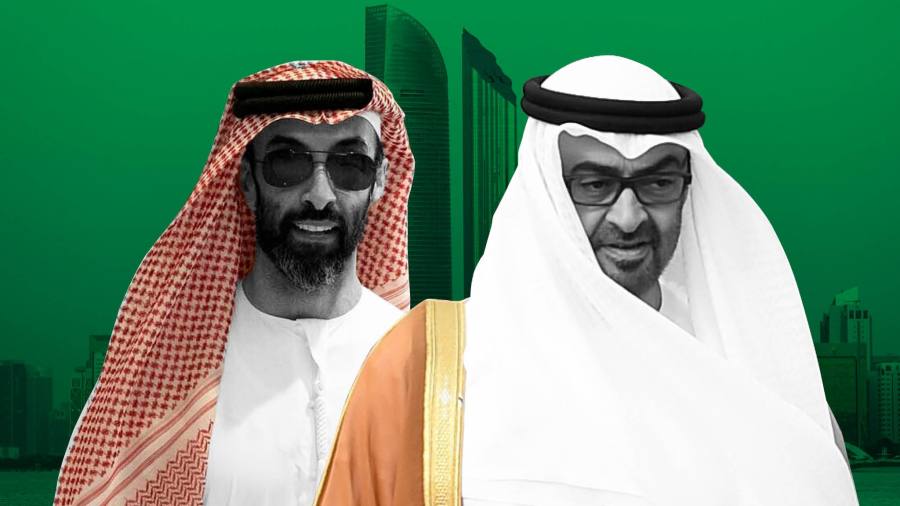[ad_1]
Days after the United Arab Emirates rocked the Middle East by revealing it would normalise relations with Israel, the first publicly announced meeting took place between officials from the erstwhile foes. It involved two of the countries’ most powerful men, both of whom typically operate in the shadows.
On one side was Yossi Cohen, head of Mossad, Israel’s feared overseas spy agency; on the other was Sheikh Tahnoon bin Zayed al-Nahyan, the UAE’s national security adviser. The meeting in August last year in the UAE suggested that intelligence co-operation would be at the core of the new alliance. And it thrust Sheikh Tahnoon — who has emerged as one of the UAE’s most influential figures — into the limelight.
His rise over the past decade epitomises the nexus between power, business and national strategic interest in Gulf states such as the UAE, Saudi Arabia and Qatar, where a younger, tech-savvy and security-minded generation of royals have come to the fore. It also offers a glimpse into the inner workings of Abu Dhabi’s absolute monarchy, where the ruling family and a clique of trusted lieutenants dominate security and key sectors of the economy, blurring the lines between state and private enterprise.
“He oversees everything. He’s the trusted under-the-radar guy,†says Kirsten Fontenrose, former senior director for Gulf affairs at the National Security Council in the Trump administration. “Part of that is mystique. He’s quiet and he’s always everywhere. He’ll be in the US, and the next thing you know he’s in Tehran, but he won’t have told you.â€
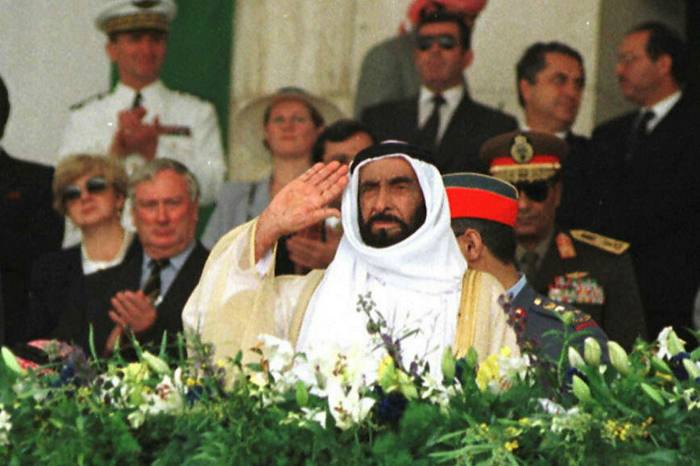
A full brother of Sheikh Mohammed bin Zayed, Abu Dhabi’s crown prince and the UAE’s de facto leader, Sheikh Tahnoon manages a sprawling portfolio that straddles national security and the often opaque corporate sector in the oil-rich emirate.
On foreign policy, the 51-year-old martial arts expert is trusted by Sheikh Mohammed, or MBZ as he is known, to handle the nation’s most sensitive and challenging issues: the UAE’s Iran and Yemen files, as well as security and intelligence co-operation with the US, Russia and the UK, former western officials say. Sheikh Tahnoon has also been at the forefront of the Gulf state’s battle against coronavirus.
His interests extend across an array of big businesses: chairman of ADQ, a state holding company set up two years ago which has rapidly become one of the emirate’s most active investors; he also chairs First Abu Dhabi Bank, the UAE’s largest lender, in which the government and ruling family have significant stakes; Royal Group, a conglomerate; and International Holding Company, another conglomerate spanning fisheries to healthcare whose assets quadrupled to about $4bn in 2020, the year Sheikh Tahnoon took over as chair.
In January he was named chair of Group 42, an Abu Dhabi-based entity set up in 2018 that describes itself as an artificial intelligence and cloud computing company. It was born out of Sheikh Tahnoon’s security role, and he has been considered its patron since its inception. Such developments are not dissimilar to ventures in Israel, where veterans of the Israel Defense Forces incubate tech companies while working closely with the IDF and defence industry.Â
And in a sign of how security, national strategy and royal or state-related interests often overlap, G42 was the first UAE company to open an office in Israel after normalisation. It has also partnered with Chinese company BGI to open a coronavirus laboratory in Abu Dhabi and conduct trials for a vaccine.
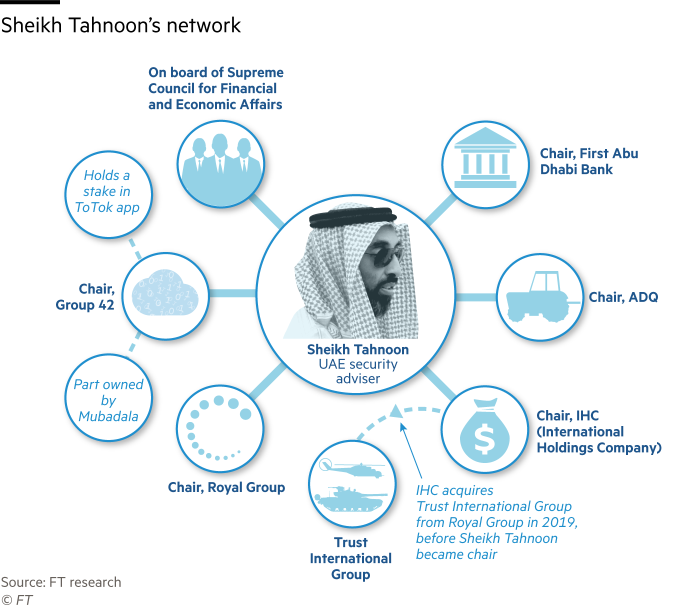
With the pandemic sharpening Abu Dhabi’s focus on health, technology and food security, companies affiliated with Sheikh Tahnoon have conducted a series of deals in areas of national strategic interest. ADQ acquired an indirect 45 per cent stake in Louis Dreyfus Company in November. The deal included a long-term agreement for the global merchant and processor of agricultural goods to supply the Abu Dhabi holding company with agri-commodities. It is part of a trend that has seen him become the most active member of the ruling family whose business interests overlap with the state’s.
But one consequence of the increased royal presence in business is a narrowing of the space for the private sector in an economy dominated by the state.
“If you have a guy who is playing poker and he starts with two aces, better not to play against him,†says a foreign executive with years of experience in Abu Dhabi. “You can’t compete against the royal family when all the big business is generated by the state.â€
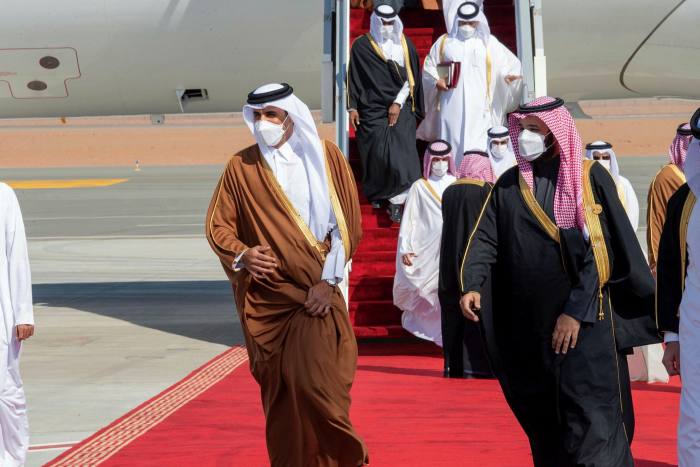
Taking control
The blurring of lines between the state and royal interests has long been a characteristic of Gulf states. But it has become more pronounced, particularly in the UAE and Saudi Arabia, at a time when leaders of the two countries have become more autocratic, security conscious and determined to develop new sectors, often related to technological advances.
Steffen Hertog, a Gulf expert at the London School of Economics, says the leaderships are now more centralised, with more control and less of a “power balance between brothers, uncles and nephewsâ€.
“It’s strategic, and more intended to have political control than rent-seeking, and very much under the control of MBZ in the UAE,†he says. “It’s a bit like the new generation of royals in Saudi Arabia who are all sidekicks of Prince Mohammed [bin Salman]. It’s [centralisation] being deployed more as a tool of the leader rather than the amorphous block that you had before.â€
The Saudi crown prince has become the overarching figure across security and the economy — he was appointed defence minister and head of a powerful new Council of Economic and Development Affairs, days after his father, King Salman, ascended the throne in January 2015.
As chair of the Public Investment Fund, Prince Mohammed, 35, has transformed the country’s $400bn sovereign wealth fund into an omnipresent force, and his main tool to make overseas investments. Like his Emirati counterpart Sheikh Mohammed, the crown prince has also driven assertive foreign policies.
A younger generation of royals is also at the helm in Qatar, where Sheikh Tamim bin Hamad al-Thani became emir aged just 33. Under his watch, Sheikh Mohammed bin Abdulrahman al-Thani, a 40-year-old distant relative of the emir, has become a rising star. He has been promoted through the ranks to become the wealthy state’s foreign minister and most powerful investor as the hands-on chair of the Qatar Investment Authority.
Bio: Sheikh Tahnoon
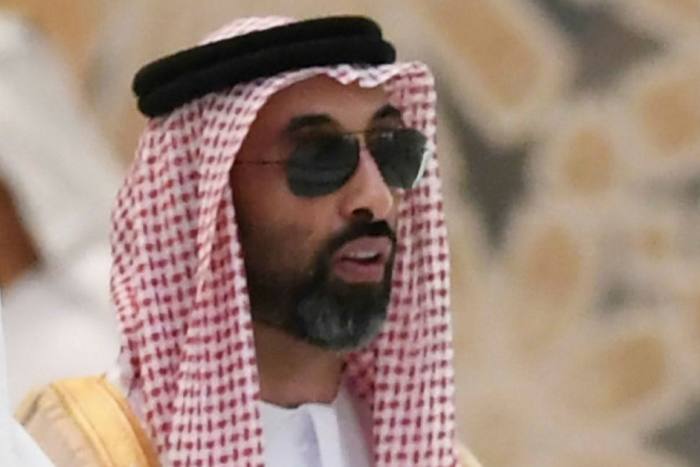
1969
Born December 4 1969, one of six full brothers who are the sons of Sheikh Zayed bin Sultan al-Nahyan, and his third wife Sheikha Fatima. He is a martial arts expert, avid cyclist, runner and a keen chess player
1992
Set up First Gulf Bank aged 23
2013
Appointed deputy national security adviser. Promoted to national security adviser in 2016
2020
Appointed to the board of newly established Supreme Council for Financial and Economic Affairs
But, says Ms Fontenrose, Sheikh Tahnoon stands out both for the breadth of his role and his ability to remain under the radar. “I don’t think he has an equivalent in other Gulf countries,†she says.
A former US diplomat describes Sheikh Tahnoon as “very much a man in the shadowsâ€, adding: “He’s got a talent for where foreign policy and national security intersect.â€
MBZ’s confidante
A son of Sheikh Zayed bin Sultan al-Nahyan, the UAE’s founding father, Sheikh Tahnoon is one of a group of six powerful full-brothers, headed by Sheikh Mohammed, who are known as the “Bani Fatima six†in reference to their mother. Others include Sheikh Mansour, the billionaire owner of Manchester City football club. Another is Sheikh Abdullah, the foreign minister.
With nine years of experience in the armed forces starting from 1991, Sheikh Tahnoon was appointed deputy to Sheikh Hazza, then national security adviser and another member of the “Bani Fatima sixâ€, in 2013. He replaced his brother three years later.
His rise coincided with an era during which Sheikh Mohammed pursued an interventionist foreign policy, deploying Abu Dhabi’s capabilities to push back against Iran and Islamist movements across the region while narrowing the space for debate at home. Today, the crown prince is arguably the Arab world’s most influential leader, with Sheikh Tahnoon his point man. “MBZ has a small circle of people he talks these kinds of issues through with, and Tahnoon would be number one,†says another former western diplomat.

In 2015, A year before Sheikh Tahnoon became national security adviser, the UAE deployed troops to Yemen as a senior partner of the Saudi-led coalition against Iranian-backed Houthi rebels. In 2017, the UAE joined Saudi Arabia in a regional embargo against Qatar. In Libya, it has supplied weapons and other support to Khalifa Haftar, the renegade general who in 2019 launched an offensive on Tripoli.
Foreign officials describe Sheikh Tahnoon as pragmatic, probing and analytical. The former US diplomat says he was the first senior Emirati to raise the prospect of the UAE pulling out of the war in Yemen, realising it could not be won, in 2016. That was three years before the Gulf state began withdrawing troops after Abu Dhabi and Riyadh had attracted widespread criticism for their role in the conflict.
The former diplomat adds that the sheikh gave the impression he was wary of the UAE’s support for Gen Haftar, recognising that he was “not a viable political leader†and an “erratic†military leader.
Those UAE interventions damaged the Gulf state’s image — UN experts have repeatedly accused the UAE of violating an arms embargo on Libya.
The US Defense Intelligence Agency “assessed†that the UAE “may provide some financing†for the Libya operations of Russia’s Wagner Group, which has deployed about 2,000 mercenaries to back Gen Haftar, according to a Pentagon inspector-general’s report released in November. The same month, Human Rights Watch released an investigation alleging that an Emirati company, Black Shield Security Services, recruited Sudanese as security guards and then dispatched them to fight in Libya. The rights group said it was “just one example of the UAE’s pernicious involvement in foreign conflictsâ€. The UAE’s foreign ministry did not respond to requests for comment.

Security focus
The creation of companies such as G42 is viewed by knowledgeable observers as an extension of the emirate’s national strategic goals as it relies heavily on technology in sectors ranging from security to health. Its relationship with Israel is expected to focus on these and other areas such as agritech, with entities linked to the state and the ruling family likely to take the lead.
There have, however, also been allegations of a darker domestic aspect to the security-minded leadership. The UAE authorities — which have perceived threats from Sunni Islamists, Shia militants and Iran over the past decade — have been accused of using surveillance to monitor domestic critics and opponents. Ahmed Mansoor, an Emirati human rights activist, was sentenced to 10 years in prison in 2018 for insulting the “status and prestige of the UAE and its symbolsâ€. Activists have alleged his phone was targeted by the security services using spyware produced by Israeli firm NSO Group.Â
In 2019, a New York Times report quoted US officials as saying ToTok, a free messaging app launched in the UAE that year, was used to spy on its users. ToTok described the allegations as being “misleading and outright falseâ€. ToTok, whose app was removed from both Apple’s App Store and Google’s Play Store, has insisted its privacy policy is compliant with international standards and that it has no ties to the government.
G42 has invested in the messaging app. Osama al-Ahdali, who is part of Sheikh Tahnoon’s “executive network†of trusted lieutenants in business, according to a person close to the senior member of the ruling family, was until last month listed as a ToTok director. Hamad al-Shamsi, another member of his network and a former IHC board member, is the only director listed for G42. In addition, Mr Shamsi is general manager of the private office of Sheikha Fatima, Sheikh Tahnoon’s mother.
The person close to Sheikh Tahnoon says neither Mr Ahdali nor Mr Shamsi had or have executive roles at ToTok or G42.
G42 has been branching out. In October, Kabul announced the group was part of a consortium that signed contracts with the Afghan aviation authority related to “security services, operation management, ground handling and aviation systems and technologyâ€.


Its ties to the state were strengthened when Mubadala, a sovereign investment vehicle chaired by Sheikh Mohammed, took an undisclosed stake in G42 in November.
“The line between royals and business [in Abu Dhabi] is getting blurred. I don’t think it exists now; it’s very hard to say what is the exclusive preserve of the private sector,†says the foreign executive. “I don’t think there are any credible private sector players in strategic sectors.â€
Royal ventures
When Sheikh Zayed was alive, Sheikh Tahnoon handled the family’s “private departmentâ€, the person close to Sheikh Tahnoon says. He set up First Gulf Bank, which later merged with National Bank of Abu Dhabi to form First Abu Dhabi Bank, when he was just 23. But in the years after Sheikh Zayed’s 2004 death, several other sons such as Sheikh Mansour pursued their own paths in business.
“If you wanted to negotiate a commercial deal with the family, not at the palace, you would approach through Tahnoon,†says the foreign executive. “As soon as they [the sons] got their own pot of money when Sheikh Zayed died . . . some of the guys wanted to do their own stuff.â€
Sheikh Tahnoon was always “very interested in businessâ€, he adds. “He would talk about the subject you were talking about by referencing things he read in his briefings.â€
Over the past two years the holding company IHC has been on a buying spree, including the acquisition of Trust International Group, a defence company, and other Royal Group assets. The pandemic has created new opportunities for companies affiliated to Sheikh Tahnoon, including Pure Health, a lab operator 30 per cent owned by IHC, and Tamouh Healthcare, which is owned by IHC and has been involved in the UAE’s testing programme.Â

The person close to Sheikh Tahnoon says he is a huge believer in “technology, especially in a post-Covid worldâ€.
“He puts his money where his mouth is. He strives to scale his businesses through technology, AI and digitisation,†the person adds. “Economic security is a key component of any country’s national security objectives, especially in a country like the UAE, which aims to create a knowledge-based economy less reliant on oil.â€
A veteran consultant in the region says the confluence of his economic and security roles makes Sheikh Tahnoon the second most influential man in Abu Dhabi, after Sheikh Mohammed. But he adds that the royal could be reaching the peak of his power as the crown prince’s children, notably Sheikh Khaled bin Mohammed, take up prominent positions in security and economic policy.
“The big question is whether we have seen the high watermark of his influence,†the consultant says. “Or whether the emergence of a new generation of leaders means his responsibilities could diminish.â€Â
Sheikh Tahnoon’s longevity may rest on the extent to which his projects boost the UAE economy, says another regional expert: “Who would be Superman forever?â€
[ad_2]
Source link

